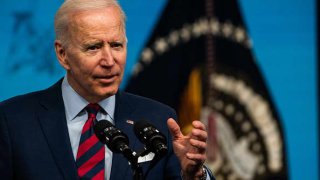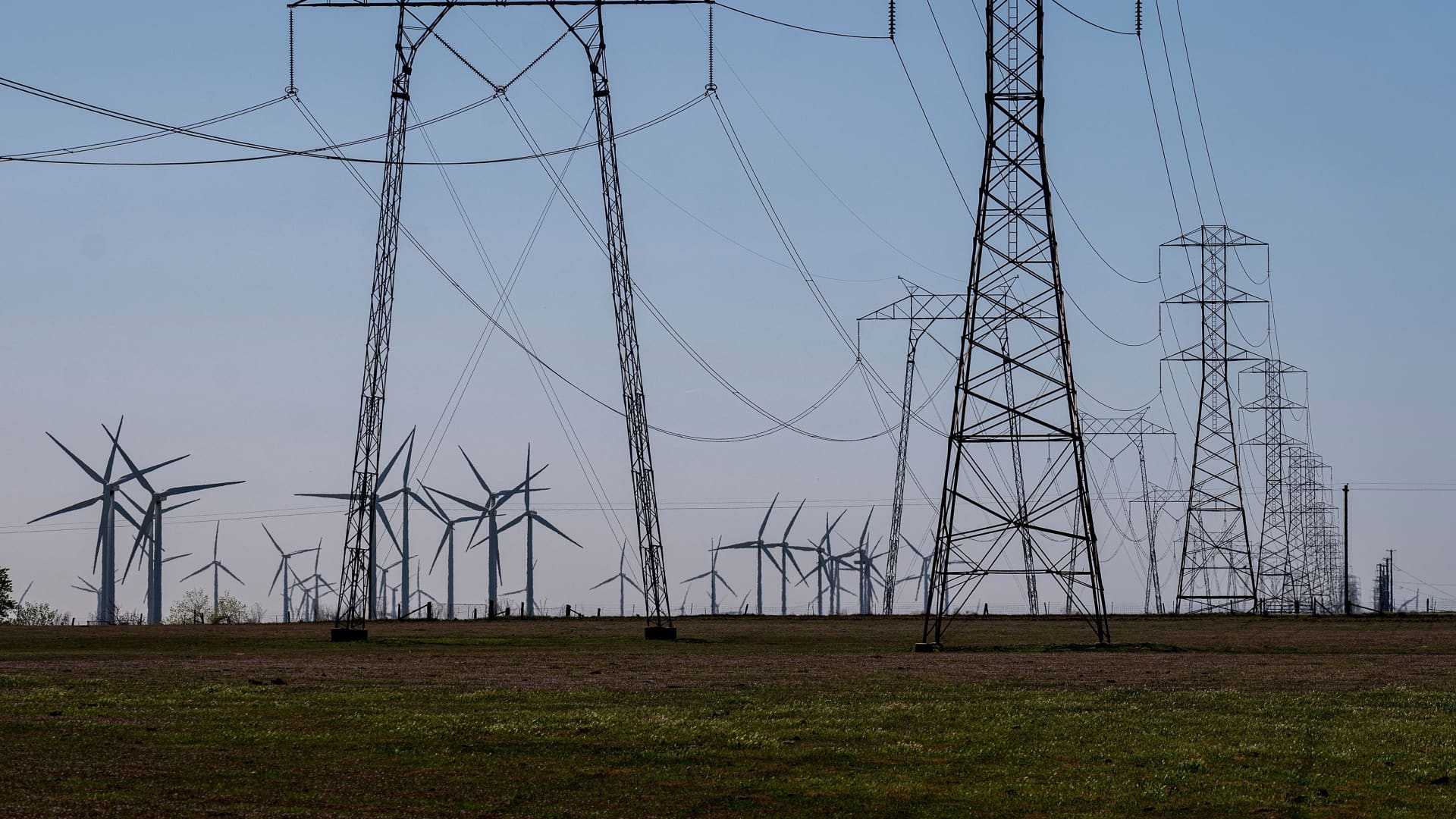
- As President Joe Biden tries to curry favor for a corporate tax hike, the administration has other ways it could fund a $2 trillion infrastructure plan.
- Biden could return to a campaign promise to compel the country's wealthiest households to contribute more in income taxes.
- He could also try to increase the federal gasoline tax, create a so-called mileage tax, or better monetize the U.S. electrical grid.
- Biden will meet with lawmakers from both parties Monday to kick off negotiations in earnest.

As President Joe Biden attempts to curry favor for his proposed corporate tax hike, the administration still has other ways it could try to fund and finance its $2 trillion infrastructure legislation.
Biden could decide, for example, to return to a campaign promise to ask the country's wealthiest households to contribute more in personal income taxes or lobby to increase the federal gasoline tax.
Other funding ideas include a so-called mileage tax and better monetization of the U.S. electrical grid. Democrats may ultimately lean on a special class of bonds to finance their spending plans despite objections from the GOP and concerns about the growing national debt.
While both parties agree that the U.S. is in dire need of infrastructure repair, the GOP has thus far opposed the Biden plan for funding too many projects beyond what they consider critical infrastructure.
Get Tri-state area news delivered to your inbox. Sign up for NBC New York's News Headlines newsletter.
Senate Minority Leader Mitch McConnell, R-Ky., has dubbed the American Jobs Plan a "Trojan horse" for liberal policies, while others have balked at the hundreds of billions of dollars earmarked for items other than improvements to roads, bridges, airports and public transit.
Money Report
Those agenda items, coupled with the administration's $1.9 trillion Covid-19 relief package signed in March, have convinced Republicans and some moderate Democrats that the White House should seek ways to pay for the plan upfront with new taxes.
Partially to quell funding concerns, Biden has offered a "Made In America" tax plan that includes hiking the corporate tax rate to 28% and removing incentives for corporations to send factories and profits offshore. Treasury Secretary Janet Yellen announced Wednesday that the tax plan would generate about $2.5 trillion over 15 years.
That proposal, however, amounts to a partial rollback of former President Donald Trump's 2017 tax cuts and is already opposed by Republicans and Democratic Sen. Joe Manchin of West Virginia.
Those concerned about a corporate tax hike say increasing the rate could hinder a fragile economic recovery and make the U.S. a less attractive place for businesses to build factories and hire workers.
Biden, in a speech addressing infrastructure Wednesday, rejected those concerns but said he was open to negotiating on the corporate tax rate. He will meet with Republican and Democratic lawmakers on Monday to kick off infrastructure negotiations in earnest.
"We've got to pay for this," Biden said Wednesday, noting that there are "many other ways we can do it."
Debt financing
To Tony Fratto, opposition to an infrastructure plan based on cost concerns doesn't make much sense.
Infrastructure "generates an economic return, and so why exactly are we constraining ourselves with the concept of putting pain on certain segments of the economy?" Fratto, a Treasury official in the George W. Bush administration, said Friday.
With U.S. interest rates still historically low, Fratto argued that it would not take long for the economic benefits generated by faster, more efficient transit to pay for the government's initial spending.
"You can make a very strong case to borrow the money and pay it back over time on the expected returns," he added. "We have failed to invest in all of the infrastructure needs that this country has by this fictional argument that it must be paid for for us to do it."
A study published by the Wharton School this week found that Biden's infrastructure plan would actually reduce U.S. debt by 6.4% in 2050 relative to current law.
If lawmakers ultimately develop an appetite for debt, the White House could try to resurrect a class of special municipal bonds known as Build America Bonds that allow states and counties to float debt with interest costs subsidized by the federal government.
Income tax
A possible alternative to a corporate tax hike would be adjustments to individual income taxes, as Biden proposed during his 2020 campaign.
Then-candidate Biden proposed raising the top individual income tax rate to 39.6% from its current level of 37%. He also called for the capital gains rate to rise to 39.6% for taxpayers with income over $1 million. Currently, wealthy investors face long-term capital gains rates of up to 20%.
Despite demanding during the campaign that the wealthiest Americans pay more as a percentage of their income, Biden has yet to say when he plans to increase income tax rates.
However, the president doubled down on a red line in his speech Wednesday.
"I will not impose any tax increases on people making less than $400,000 a year," Biden said. "If others have ideas out there on how to pay for this investment without violating that rule, they should come forward. There's all kinds of opportunities."
Gas tax
Another possible revenue generator could be an increase in the federal government's gas tax. That tax was last raised in late 1993 and is not indexed to inflation, meaning that its effective value has eroded over the last 27-plus years.
The federal government currently collects 18.4 cents per gallon of gasoline sold in the U.S. and 24.4 cents per gallon of diesel fuel. That revenue, which totaled $36.4 billion in fiscal 2016, is used by the Federal Highway Trust Fund, which funds road construction and other surface transportation projects.
Transportation Secretary Pete Buttigieg told CNBC last month that the gasoline tax may soon be an outdated mechanism to raise significant revenue as more Americans switch to electric vehicles and fuel-efficient cars.
Republican Sen. Roy Blunt of Missouri, a supporter of a far-smaller infrastructure bill, told "Fox News Sunday" that funding for repairs to the nation's roads and bridges needs to evolve over time.
"As we have more electric vehicles, we're going to have to figure out some way that those electric vehicles pay their fair share," he said Sunday. "We may even have to figure out a different way that driverless vehicles pay for the increased kind of monitoring that needs to happen with the highway system itself you have with that."
States, too, have for years imposed their own taxes on the sale of gasoline.
In 2019, the Republican governors of Ohio, Alabama and Arkansas signed fuel tax hikes in an effort to help fund road repair, and in 2018, Michigan's Democratic governor, Gretchen Whitmer, won election after campaigning on the slogan "Fix the Damn Roads."
However, several Republican senators opposed increasing the gas tax when former President Donald Trump sought to make a push on infrastructure.
As of Jan. 1, total state taxes and fees on gasoline averaged 30.06 cents per gallon, according to the U.S. Energy Information Administration.
Mileage tax
Buttigieg said a mileage tax could be a more attractive option than a gas tax for lawmakers who support the idea that consumers should pay for infrastructure based on how often they use it.
"I'm hearing a lot of appetite to make sure that there are sustainable funding streams," the Transportation secretary said in March. A mileage tax "shows a lot of promise if we believe in that so-called user-pays principle: The idea that part of how we pay for roads is you pay based on how much you drive."
The mileage tax is a relatively new idea, and so there are a few barriers to it becoming a reality in the near term. Questions remain over how to record the distances individuals travel, how and where fees would be collected, and whether the introduction of such a tax would disproportionately impact low-income or rural communities that rely on cars to get to work.
Still, a vehicle miles tax, or VMT, does enjoy bipartisan support on the key House Transportation and Infrastructure committee. Both Chairman Peter DeFazio, D-Ore., and Ranking Member Sam Graves, R-Mo., have voiced support for VMT measures in the past.
"It's become abundantly clear that we need to move on from the gas tax and diesel tax as the primary means of building infrastructure," Graves wrote in March. "Although critics will say that we're not ready for VMT, we've heard that same argument for too long. The Highway Trust Fund continues to lose more and more revenue because not all users are paying their fair share given increased fuel efficiency and electric vehicle technology."
Monetizing the electrical grid
Fratto suggested the federal government could look to tax Americans' electricity consumption as a greater percentage of the U.S. population switches to electric vehicles.
That could take the form of at-home grid use or fees levied at charging stations akin to a gas tax for petroleum-powered cars. That may be an appealing option in the future, Fratto said, since utility companies have already established and installed ways to keep track of and charge for the energy consumed by each household.
"There are lots of other user fees that we have across all these systems that we could use, including the electricity sector," the former Treasury official said. "We can take some fee off the use of the grid in order to pay back the federal government for its investment in those areas."
"You could easily attach a fee that power companies would have to pay, and the same goes for the availability of electricity," he added.
Smaller corporate tax hike
Ultimately, how Biden finances his plan and the degree to which he relies on a corporate tax hike will depend on how much he wants bipartisan support from a Republican Party that is calling for him to scale back his ambitions and focus on a package closer to $600 billion.
The president and the Democratic leadership in Congress could opt to use the reconciliation process, as they did for the Covid relief bill, which would allow them to pass the legislation with a simple majority in the evenly divided Senate.
In that case, Biden could bypass Republican objections and he would play largely to an audience of one in the Senate — Sen. Joe Manchin.
Though the conservative West Virginia Democrat opposes raising the corporate rate to 28%, he might be willing to meet Biden in the middle.
"As the bill exists today, it needs to be changed," Manchin told Hoppy Kercheval, the host of West Virginia Metro News' "Talkline" show. "I think [the corporate rate] should have never been under 25%, that's the worldwide average. And that's what basically every corporation would have told you was fair."






